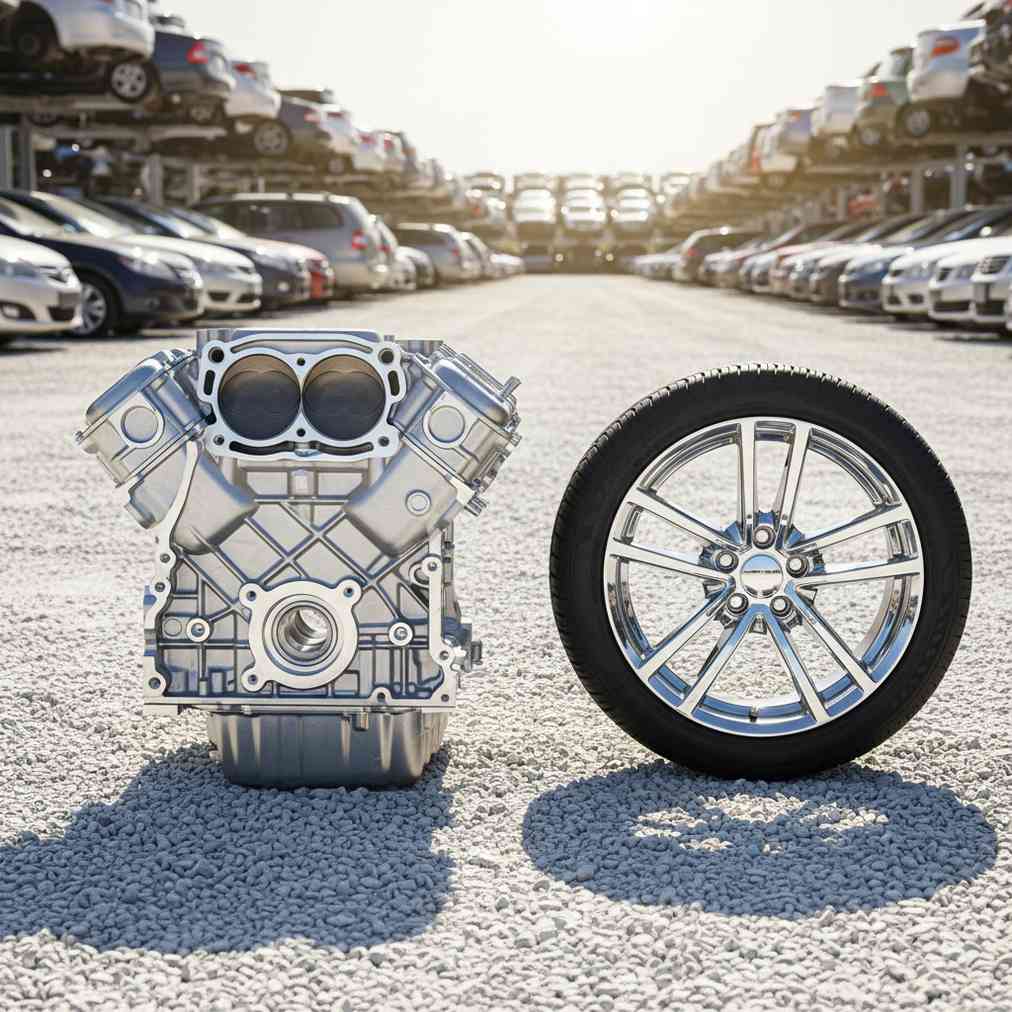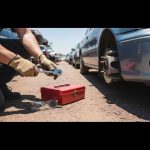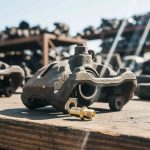The Corporate vs Traditional Junkyard Divide: Understanding the Landscape
When searching for used auto parts or looking to find a junkyard near you, understanding the fundamental differences between major chains like LKQ and traditional operators like U-Pull-It and Pull-A-Part can save you hundreds of dollars and countless frustrations. The auto recycling industry has undergone significant consolidation over the past decade, creating distinct experiences for DIY mechanics and hobbyists.
The landscape of automotive salvage has evolved dramatically, with corporate chains implementing standardized pricing structures while traditional yards maintain the hands-on, negotiable approach that built the industry. This shift reflects broader trends in business standardization, similar to how data trends and predictions for 2025 show increasing automation and systematization across industries.
LKQ Corporation: The Walmart of Auto Recycling
LKQ Corporation has established itself as the largest auto recycling operation in America, processing over 600,000 vehicles annually. This massive scale brings both advantages and disadvantages for customers seeking affordable used auto parts.
Corporate Structure and Pricing Philosophy
LKQ’s corporate approach emphasizes standardization and efficiency. Their LKQ Pick Your Part locations operate under strict pricing guidelines that often leave little room for negotiation. While this ensures consistent experiences across locations, it frequently results in higher costs for consumers.
- Mandatory warranty fees on simple plastic parts
- Full-price requirements for partially stripped parts
- Non-negotiable pricing structures
- Standardized policies across all locations
The Hidden Costs of Corporate Efficiency
Customer experiences with LKQ frequently involve sticker shock when supposedly simple purchases accumulate unexpected fees. For example, customers report being charged full price for a truck tailgate missing its window actuator and interior trim panel, with no price reduction for the stripped condition.
“I found a tailgate that was already missing components, but LKQ required me to pay the full price for a complete assembly. There was no flexibility in their pricing system.”
– Frustrated LKQ Customer Review
U-Pull-It and Pull-A-Part: Preserving Traditional Values
Traditional operators like Pull-A-Part and various U-Pull-It locations maintain the authentic junkyard experience that appeals to hobbyists and budget-conscious repair enthusiasts.
The Hobbyist-Friendly Approach
These yards typically offer more flexible pricing and maintain the traditional “pick-and-pull” atmosphere that automotive enthusiasts appreciate. Their business model focuses on volume through accessibility rather than maximizing profit per transaction.
- Transparent pricing with minimal hidden fees
- Condition-based pricing for damaged parts
- Lower base prices on common parts
- Negotiation possibilities in some locations
Pricing Comparison: The Numbers Don’t Lie
The price differences between corporate chains and traditional yards can be substantial, particularly for common parts like used alternators and AC compressors.
| Part Type | LKQ/Corporate Chain | U-Pull-It/Pull-A-Part | Savings |
|---|---|---|---|
| Alternator | $55 (with fees) | $20 + $5 core | $30 (54%) |
| A/C Compressor | $78 (with fees) | $37 (no core) | $41 (53%) |
| Starter Motor | $65 (with warranty) | $35 + core | $25-30 (42%) |
The Core Charge Factor
Understanding core charges becomes crucial when comparing prices. Traditional yards often have more transparent core policies, while corporate chains may bundle these charges into their pricing structure without clear disclosure.
Recent Industry Developments: Private Equity and Consolidation
The automotive recycling industry continues evolving, with significant corporate restructuring affecting customer experiences. LKQ Corporation recently sold its Self Service segment (“Pick Your Part”) to Pacific Avenue Capital Partners for $410 million, signaling a strategic shift away from the self-service model.
This private equity acquisition raises concerns about future pricing and policies, as profit maximization often takes precedence over customer affordability. Similar patterns emerge across industries where private equity firms acquire consumer-facing businesses.
Impact on Traditional Yards
Several factors contribute to the decline of independent salvage yards:
- Rising liability insurance costs
- Environmental compliance expenses
- Corporate competition driving down margins
- Real estate pressure in urban areas
Customer Service: Corporate Efficiency vs Personal Touch
The customer service experience varies dramatically between corporate chains and traditional operators, often reflecting their different business philosophies and operational structures.
LKQ Customer Service Challenges
Corporate standardization at LKQ locations often creates inflexible customer service experiences. Staff typically have limited authority to adjust prices or make exceptions, leading to frustrating interactions when customers encounter damaged or incomplete parts.
Traditional Yard Advantages
Independent operators and traditional chains often maintain more personal relationships with regular customers. This approach allows for:
- Flexible problem resolution
- Local manager authority for pricing adjustments
- Personal relationships with repeat customers
- Common-sense policies for unusual situations
The Fee Structure Breakdown: Understanding What You’re Really Paying
Understanding the various fees charged by different yard types helps customers make informed decisions and avoid surprise costs at checkout.
| Fee Type | LKQ/Corporate | Traditional Yards | Notes |
|---|---|---|---|
| Entrance Fee | $0-5 | $2-5 | Sometimes waived with purchase |
| Warranty/Guarantee | Mandatory 5-15% | Optional or included | Often non-refundable |
| Environmental Fee | $2-5 per visit | $1-3 per visit | Varies by state regulations |
| Core Charges | Built into price | Separate, refundable | Traditional more transparent |
Geographic Variations and Regional Differences
Location significantly impacts both pricing and availability of different yard types. Urban areas tend to favor corporate chains due to real estate costs and regulatory compliance, while rural areas often maintain traditional operations.
Regional Hotspots for Traditional Yards
Certain regions maintain strong concentrations of independent and traditional operators:
- Southeast: Atlanta and surrounding areas
- Texas: Houston metropolitan area
- Midwest: Chicago suburbs and rural Illinois
- West Coast: Inland California markets
Quality and Inventory Considerations
The source and quality of inventory often differs between corporate chains and traditional yards, affecting part availability and condition.
Corporate Chain Inventory Management
LKQ’s massive scale allows for sophisticated inventory tracking and online search capabilities. However, this efficiency comes with standardized processing that may remove valuable parts before vehicles reach self-service lots.
Traditional Yard Inventory Benefits
Smaller operators often provide more complete vehicles with original parts intact. This approach benefits customers seeking:
- Original equipment manufacturer (OEM) parts
- Complete assemblies with all components
- Rare or specialty parts
- Performance modifications left by previous owners
Environmental Impact and Sustainability
Both corporate chains and traditional yards contribute to automotive sustainability, but their approaches differ significantly. Corporate operations often emphasize measurable environmental metrics and compliance, while traditional yards focus on practical reuse and local impact.
The environmental benefits of choosing recycled auto parts remain consistent regardless of yard type, with each recycled part preventing new manufacturing and reducing waste streams.
Technology Integration and Modern Conveniences
Corporate chains typically invest more heavily in customer-facing technology, while traditional yards maintain simpler, more direct approaches.
| Technology Feature | Corporate Chains | Traditional Yards |
|---|---|---|
| Online Inventory Search | Comprehensive, real-time | Basic or phone-based |
| Mobile Apps | Full-featured | Rare |
| Digital Payment Options | Credit/debit, contactless | Often cash-preferred |
| Part Reservations | Online systems | Phone-based holds |
Making the Right Choice for Your Needs
Selecting between corporate chains and traditional yards depends on your specific priorities, budget constraints, and project requirements.
Choose Corporate Chains When:
- Convenience matters most and you prefer standardized experiences
- Online inventory searches are essential for your planning
- Warranty coverage justifies the additional cost
- Professional repair shop efficiency requirements
Choose Traditional Yards When:
- Budget constraints make every dollar count
- Complete assemblies with all original parts are needed
- Negotiation flexibility could benefit your purchase
- Supporting local businesses aligns with your values
Future Industry Trends and Predictions
The automotive recycling industry continues evolving, with several trends shaping the customer experience. As big data research topics for 2025 suggest, increased data analytics and artificial intelligence will likely drive further standardization in corporate operations.
Electric vehicle adoption presents both challenges and opportunities for both yard types, as traditional mechanical expertise must evolve to handle high-voltage systems and specialized parts.
Maximizing Value Regardless of Yard Type
Whether you choose corporate efficiency or traditional flexibility, several strategies help maximize your automotive recycling investment.
Universal Money-Saving Tips:
- Research part compatibility before visiting
- Bring necessary tools and safety equipment
- Visit during off-peak hours for better selection
- Inspect thoroughly before purchasing
- Understand return policies and warranty terms
If you’re considering selling your vehicle for cash, understanding these industry dynamics helps you choose buyers who offer fair prices and transparent transactions.
The Bottom Line: Knowledge Empowers Better Decisions
The automotive recycling industry offers distinct experiences through corporate chains like LKQ and traditional operators like U-Pull-It and Pull-A-Part. Understanding these differences empowers consumers to make informed decisions based on their specific needs, budgets, and project requirements.
While corporate consolidation continues reshaping the industry landscape, traditional values of affordability and flexibility persist in many markets. Smart consumers leverage both types of operations strategically, choosing corporate convenience when appropriate and traditional savings when budget matters most.
The key lies in recognizing that not all junkyard chains are created equal, and your choice between them can significantly impact both your wallet and your overall automotive repair experience. Whether you prioritize standardized efficiency or traditional flexibility, understanding these fundamental differences ensures you get the best value for your automotive recycling needs.





Leave a Reply
You must be logged in to post a comment.